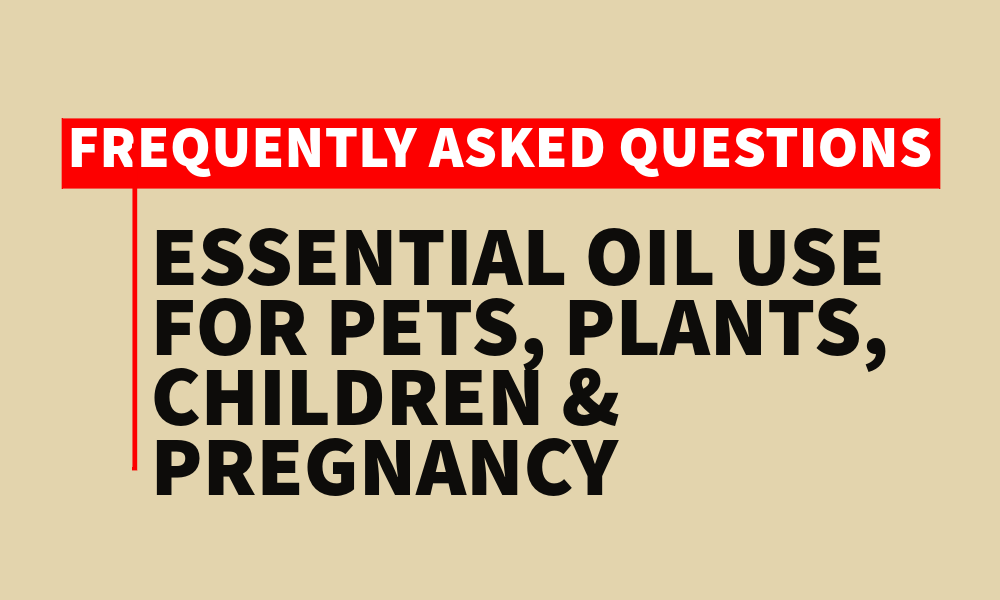
Frequently Asked Questions for Essential Oil Use: Children, Cats, Dogs, Plants and Pregnancy
WHAT ARE ESSENTIAL OILS?
Essential oils are highly concentrated, natural plant-based aromatics. Essential oils are typically produced by distillation of the leaves, wood, petals, buds, needles, bark or roots of aromatic plants such as lavender, rosemary, cedarwood, rose, peppermint and cypress. While most essential oils are distilled, Citrus types are typically produced through cold pressing or steam distillation. They are known to have benefits such as reducing anxiety, aiding sleep and nausea.
ARE ESSENTIAL OILS SAFE FOR CATS?
Whilst essential oils can boast a variety of benefits for humans, they can pose problems for cats. This is because cats do not have the liver enzymes needed to metabolise essential oils, meaning even small quantites can be toxic for them. Whilst not all oils are toxic, it is highly recommended to speak to a veternarian before use, please see the list below for some oils known for their toxicity to cats
- Tea Tree is highly toxic to cats, and can cause skin irritation, lethargy, and liver damage.
- Peppermint is known to irritate their skin and mucous membranes.
- Citrus Oils should be avoided due to their potential harm.
- Ylang Ylang, Lavender, Wintergreen, Sweet Birch, Pine, Eucalyptus, Cinnamon, and Clove can cause respiratory issues and liver failure
Even carrier oils with high fat levels can upset their tummies. Diluted oils in reed diffusers or general household plug-ins are generally safe, however please be cautious if your cat has asthma. Take extra caution if you a diffusing pure essential oils with a Oil Diffuser, direct exposure to the wrong oil can cause liver damage, seizures and in extreme cases can be fatal. Please see the list below for some of the symptoms of Essential Oil Poisoning in Cats.
ARE ESSENTIAL OILS SAFE FOR BABIES OR CHILDREN?
Babies and children are more vulnerable to any toxicity associated with some essential oils as they have less developed immune systems and livers. It is very important to follow all safety guidelines and be cautious when using essential oils around babies and children. caution is crucial. You should always consult a healthcare provider before using essential oils on or around infants and children.
After 2 years, certain essential oils can be administered topically and through aromatherapy methods, but at a much weaker concentration than adult dosing. A safe dilution ratio is typically 0.5 to 2.5 percent.
Some examples of safety guidelines for children regarding essential oils:
- Peppermint should not be applied to or diffused around children under 6 years old.
- Eucalyptus should not be applied to or diffused around children under 10 years old.
Infants and children (or adults) should not ingest essential oils. As a safety precaution, essential oils should always be kept out of reach of children.
If you’re interested in using essential oils around babies or children, consult a medical professional before use. See the list below for essential oils that should never be used on or around babies or children:
- Eucalyptus
- Fennel
- Peppermint
- Rosemary
- Verbena
- Wintergreen
ESSENTIAL OILS TO AVOID DURING PREGANCY?
Many people worry about the use of essential oils during pregnancy, it is considered a controversial practice especially during the early phases such as the first three months. There is concern that essential oils can cross the placental barrier and harm a fetus.
Whilst there are some essential oils that should never be used during pregnancy, there are a few that are considered safe for use for pre-natal massages or with an Essential Oil Diffuser.
According to some studies, some essential oils may be effective in reducing anxiety and fear regarding childbirth.
If you’re interested in using essential oils during pregnancy, consult a medical professional before use. See the list below for some essential oils to avoid during pregnancy, labour, or while breastfeeding:
- Camphor
- Parsley Seed
- Hyssop
- Pennyroyal
- Tarragon
- Wintergreen
- Wormwood
ARE ESSENTIAL OILS SAFE FOR DOGS?
Essential oils are not know to be as toxic for dogs when compared to cars, but is important to use them safely. Below we have listed some oils considered safe for dogs.
- Lavender Oil is a popular oil , and is also considered safe for dogs. It has calming effects that can help with anxiety, car sickness, or sleep troubles.
- Myrrh, Frankincense, Chamomile, and Ginger are also considered safe for dogs. These oils can be used in a diffuser or diluted for topical application. They have various potential benefits, including soothing effects and skin support
However, there are some essential oils considered toxic to dogs. It’s essential to avoid using the oils listed below on your dog.
- Tea Tree Oil: Toxic to dogs and cats, it can cause skin irritation, lethargy, and even liver damage.
- Cinnamon Oil: Can irritate the skin and mucous membranes.
- Pennyroyal Oil: Extremely toxic and can cause seizures, liver failure, and death.
Remember that each dog is unique, so it’s essential to observe their reactions and consult with a veterinarian before using essential oils.
CAN ESSENTIAL OILS BE INGESTED?
Essential oils that are perfectly safe when used topically or in aromatherapy may be toxic when ingested. Certain oils, like wintergreen, can be deadly.
WHEN DO ESSENTIAL OILS EXPIRE?
Most essential oils can last up to three years if stored properly, they should be kept in cool place with the lid tightly sealed. Some oils such as Patchouli can last up to 10 years.
Citrus oils and Tea Tree Oil typically last for a year (in some cases two years) if stored properly.
Essential oils expire due to a process called oxidation, which is caused by oxygen and moisture. It is more commonly known as rusting which occurs on some metals. If you notice that the oil is cloudy, or more vicious it has likely expired, other signs are if it smells different or weaker
WILL ESSENTIAL OILS KILL PLANTS?
Essential oils can indeed have an impact on plants, but whether they will outright kill them depends on various factors, see the below explanation.
- Concentration: Essential oils are highly concentrated plant extracts. When used undiluted or in high concentrations, they can harm plants. For instance, direct application of undiluted essential oil to plant leaves may cause damage.
- Type of Oil: Some essential oils are more potent than others. Oils like cinnamon, oregano, and thyme have strong antimicrobial properties and can potentially harm plants. On the other hand, milder oils like lavender or lemon may have less impact.
- Method of Application:
- Spraying: If you spray essential oils directly on plant foliage, it can lead to leaf burn or other adverse effects.
- Soil Application: Diluted essential oils can be added to the soil. However, even then, moderation is key. Too much oil can disrupt the soil ecosystem and affect plant health.
- Beneficial Effects: Interestingly, some essential oils can benefit plants. For example:
- Neem Oil: Acts as a natural insect repellent and can protect plants from pests.
- Peppermint Oil: Deters aphids and ants.
- Eucalyptus Oil: Repels mosquitoes and other insects.
- Dilution Matters: If you choose to use essential oils on plants, dilute them significantly. Mix a few drops of essential oil with water or a carrier oil (such as coconut oil) before applying.
- Test First: Always perform a patch test on a small area of the plant to observe any adverse reactions before widespread application.
